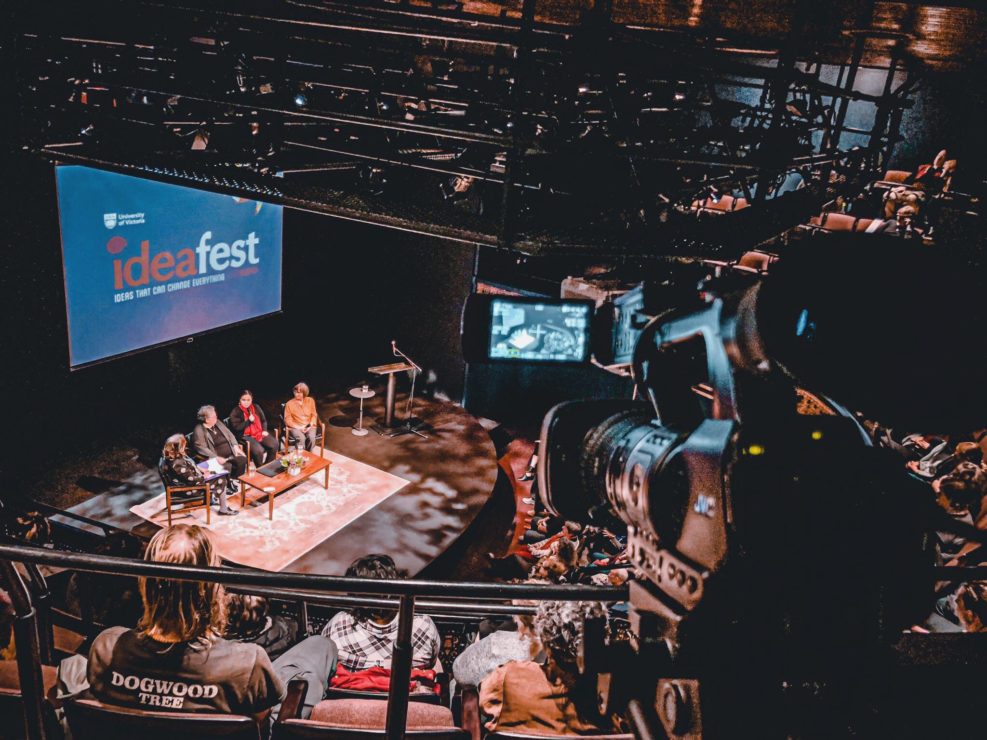Topics on climate change and health prove timely

From March 2-7, UVic’s ninth annual Ideafest offered 35 events that publicized research being done by students, faculty, and staff. The week-long festival included interdisciplinary panels, student presentations, and a thesis competition that challenges graduate students to break down their 80 000-word thesis into three-minute presentations.
“The idea is to showcase the great research that goes on at UVic,” said Tom Deas, Communications and Engagement Coordinator for UVic’s Vice-President of Research, in an interview with the Martlet. “Having this opportunity to go and see the research that is going on [at UVic] and the sort of issues that do affect everyone’s lives is really important.”
Deas also noted that the nature of the festival lends itself to timely issues. Researchers are likely to put forward ideas for events that are top-of-mind, which he sees as a key strength of the festival.
“What I like about the festival is that you’ll find that really timely issues sort of rise to the surface,” said Deas. “This year there’s a bit of a theme that has just naturally occurred. [There’s] a lot of events on health, a lot of events of climate.”
Wilfrid Greaves, an assistant professor of political science whose research focuses on security theory and environmental politics, agrees that it is important for events such as Ideafest to provide a space for the discussion of important global issues such as climate change and environmental degradation.
As one of the presenters for “Beyond plastic: Exploring the issue of waste in Canada,” Greaves spoke to the Martlet about the importance of making community members aware of the scale of the plastic problem in Canada and what the panel hopes to accomplish.
“It is a call from us, the members of the panel, to recognize that we have a really profound problem with how we use plastics in this country,” said Greaves.
He cautioned, however, that saying that Canada has a plastics problem is not the same as saying that Canada needs to eliminate plastics, as, in many ways, they are essential to our everyday lives.
“To say that we have a problem with plastics is not the same thing as saying plastics are always a problem,” explained Greaves. “We need to use plastics smarter, better, and ultimately less.”
His advice for those looking to reduce the impact of plastic is to focus on reducing the amount of prepackaged and single-use plastic items you purchase, as well as finding ways to reuse plastic items you do buy.
“In some ways it’s a return to wisdom that a lot of people know but don’t necessarily reflect on,” said Greaves. “[It’s about] emphasizing that’s the role individuals can play.”
Continuing on with timely issues, and with the noise being made by the Trump administration to the south, as well as other governments across the globe, regarding “fake news,” the panel titled “What’s truth got to do with it?” explored different conceptions of truth and how different actors such as politicians attempt to shape facts for their own aims.
Panellists Kristin Semmens and Jason Colby, both from UVic’s Department of History, explained that the goal of the panel was to explore historic abuses of truth. Semmens, whose research centers around Nazi Germany and the Holocaust explained before the panel that she planned to discuss the Nazi Party’s conception of fake news and how it molded the truth.
“My plan will be to discuss the Nazis’ conception of themselves as truth-tellers but also the accusations the Nazis made about those who lied and specifically those were often racially defined categories, in particular the Jews,” said Semmens. “My other plan is to sort of explore the concept of fake news as it was deployed by the Nazi regime.”
Colby, on the other hand, said he would focus on the trajectory of the American administration’s abuse of truth over the last four years of the Trump administration.
“I’m going to try to basically contextualize that and show the trend lines, especially in American politics and foreign policy over the last four years,” said Colby. “Show how there has been an increasingly brazen and public disregard for not just other interpretations of evidence but actually the trend towards deciding that we have our own facts and our own evidence.”
This event was held at Victoria City Hall, as opposed to on the UVic campus like most Ideafest events. According to Deas, this further allows those not familiar with what’s going on at UVic a chance to engage.
“It’s great to take the events to audiences that might not be so willing to come out to UVic,” said Deas. “To give people a chance to meet researchers and have a chance to open a dialogue and talk about the research.”
Lastly, the festival not only provides a space for faculty to present their research and experiences but also for students to do the same. Kaylin Arason, a student working with UVic’s Centre for Asia-Pacific Initiatives, was one of five students to present their experiences interning overseas with a variety of NGOs.
Arason’s presentation focused on her internship with the Global Alliance Against Traffic in Women and the learning experiences she had in Bangkok, Thailand.
“Mine is more so about my personal experience dealing with living and working in a new place, and the different kinds of challenges that came up, and how I confronted those challenges, and a lot of the reflections that I had throughout the experience,” said Arason. “A lot of self-reflection and a lot of time learning about myself which I think was probably the most transformative aspect of the experience.”
At the end of the day, for Deas, the purpose of Ideafest is to make UVic research available to everyone, which is why all events were free. “We really just want [Ideafest] to be as open and accessible as it can be,” he said.
Several of this year’s Ideafest events can be found in their entirety online at https://www.uvic.ca/ideafest2020/






